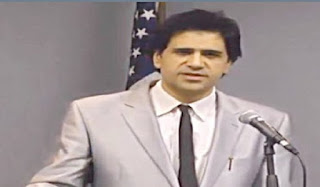By Dr. Majid Rafizadeh
This week, Iran’s state-controlled Persian news outlets put significant emphasis on a report that the White House had invited Iran’s top diplomat to the Oval Office.
The invitation was reportedly extended by the junior senator from Kentucky, Rand Paul, the first GOP senator to take any steps to initiate a meeting with Iranian leaders. He was said to have invited Iranian Foreign Minister Mohammad Javad Zarif to meet US President Donald Trump in the White House.
This was good news for Iran, as the Islamic Republic projected Paul’s offer as a victory for Tehran and a blow to the United States. This is due to the fact that, from the perspective of the Iranian leaders, any offers for negotiations from world powers is a demonstration of weakness, and grants Tehran more leverage.
In addition, the Iranian leaders’ proposals to resolve the tensions over the Joint Comprehensive Plan of Action, commonly known as Iran nuclear deal, are preposterous. For example, Zarif told Paul that Tehran is willing have its parliament turn a fatwa issued by Supreme Leader Ali Khamenei into a law that would forbid the production of nuclear weapons, if the Trump administration lifts the sanctions against Iran. The foreign minister was referring to a fatwa against nuclear weapons that was reportedly issued by Iran’s supreme leader in 2010, which stated: “We consider the use of such weapons as haram (religiously forbidden) and believe that it is everyone’s duty to make efforts to secure humanity against this great disaster.”
But these fatwas issued by Iran’s ruling mullahs can be nothing but collections of words. Unfortunately this has not stopped some world leaders from falling into Iran’s trap and believing the narrative. For example, in his address to the UN General Assembly on September 24, 2013, former US President Barack Obama invoked Khamenei’s fatwa, stating: “The supreme leader has issued a fatwa against the development of nuclear weapons.” Former US Secretary of State John Kerry said: “The supreme leader...says he has issued a fatwa, the highest form of Islamic prohibition against some activity, and he said that is to prohibit Iran from ever seeking a nuclear weapon.”
Even if we trust the words of the regime’s leader, Khamenei’s fatwa does not forbid the development of nuclear weapons; it only bans the “use of such weapons.” In addition, while all other fatwas issued by Iran’s supreme leader are listed on his official Persian website, the nuclear fatwa is not included.
More importantly, nothing can prevent the supreme leader or the Iranian parliament from changing laws and fatwas. In fact, Iran’s previous supreme leader, Ayatollah Khomeini, changed several of his fatwas regarding women, the economy and human rights after he took control of the country.
Zarif also reportedly stated that the Islamic Republic could expand its ratification of the Additional Protocol — an expanded set of requirements for information and access to help the International Atomic Energy Association (IAEA) confirm that states are using nuclear material only for peaceful purposes — to permit inspectors “to conduct complementary access to any location in Iran.”
However, there is an important caveat to this. The Additional Protocol does not include military sites, at which it is suspected Iran is conducting nuclear research and development. Iranian opposition group the National Council for Resistance of Iran was the first to reveal Iran’s clandestine nuclear activities at two major sites, Natanz and Arak, in 2000. Last year it released critical information showing that Iran’s nuclear activities continue at the military site in Parchin, which is out of the reach of IAEA inspectors.
When leaders of a world power shake hands with Iranian leaders and sit at the same table with them, they are only granting the Iranian regime more credibility.
Dr. Majid Rafizadeh
Meeting diplomats of such a rogue state is also a mistake for several other reasons. First of all, it grants legitimacy to the regime. When leaders of a world power shake hands with Iranian leaders and sit at the same table with them, they are only granting the Iranian regime more credibility and photo opportunities. For instance, when the Obama administration began meeting Iranian leaders, Tehran gained global legitimacy and significantly improved its ties with European countries.
Secondly, meeting a regime that is a leader in human rights violations would be a blow to the Iranian people who seek democracy, because it will embolden and empower the regime’s forces. According to the Oslo-based non-governmental organization Iran Human Rights, at least 273 people were executed in Iran in 2018. This ranked Iran second in the world in terms of the number of people executed last year, and first in terms of the number of executions per capita.
The Iranian regime also continues to be a leading executioner of children, and the number of juveniles executed increased in 2018. In addition, at the discretion of the judiciary or the Islamic Revolutionary Court, many activists continue to be arrested and tortured on ambiguous charges, such as “spreading moharebeh” (corruption on earth), “waging war against God” or endangering the country’s national security.
Thirdly, Iranian diplomats do not have the final say in Iran’s foreign policy; Iran’s supreme leader and the senior generals of the Islamic Revolutionary Guard Corps and Quds Force make the final decisions.
In a nutshell, meeting with Iranian leaders will accomplish nothing except empowering the rogue state, giving it credibility and legitimacy, and further suppressing those in the Iranian population that seek democracy and freedom.

- Dr. Majid Rafizadeh is a Harvard-educated Iranian-American political scientist. He is a leading expert on Iran and US foreign policy, a businessman and president of the International American Council. Twitter: @Dr_Rafizadeh
This article was first published by arabnews





Comments
Post a Comment